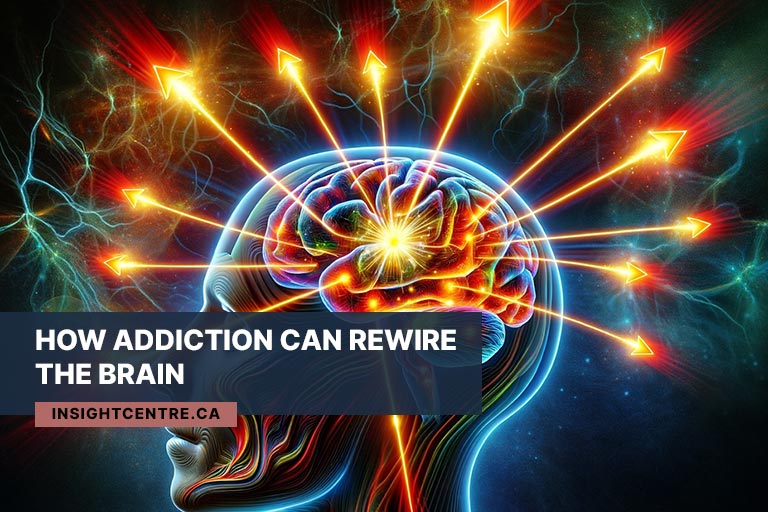
Addiction is more than a series of bad choices; it’s a profound and often misunderstood alteration of the brain’s wiring. This comprehensive exploration delves into the neurological metamorphosis triggered by addiction, examining its impact on behaviour, cognition, and emotional regulation. Understanding this transformation is crucial for developing effective strategies in addiction therapy.

Addiction is often misconstrued as a mere lack of willpower or moral failing. However, this perspective overlooks the profound neurological changes addiction instigates in the brain. Understanding these changes is pivotal for both those battling addiction and the society striving to support them. In this extended exploration, we delve deeper into how addiction commandeers the brain, altering its structure and function, and the implications of these changes.
The reward system, which includes regions like the nucleus accumbens and ventral tegmental area, is designed to reinforce behaviours necessary for survival. However, addictive substances and behaviours hyperactivate this system, creating a euphoric state that the brain comes to crave. Over time, this leads to neuroadaptive changes, where the brain requires more of the substance or behaviour to achieve the same level of reward – a phenomenon known as tolerance. This tolerance is a key marker of addiction, reflecting a significant neurobiological shift.
Addiction affects the prefrontal cortex, the brain area responsible for executive functions like decision-making, planning, and impulse control. Chronic exposure to addictive substances or behaviours can weaken the functionality of this particular region. This impairment manifests as reduced self-control, poor judgment, and difficulty in delaying gratification. Individuals struggling with addiction might find it increasingly challenging to resist urges or consider long-term consequences, leading to a cycle where immediate gratification takes precedence over long-term well-being.
The hippocampus and amygdala, crucial for memory and emotional processing, also undergo significant changes in addiction. The hippocampus forms powerful memories associated with the substance or behaviour, while the amygdala creates an emotional response to these memories. These changes result in intense cravings when exposed to cues associated with the addiction, making relapse more likely even after periods of abstinence.
Chronic addiction also dysregulates the body’s stress systems. The brain’s normal response to stress is altered, often leading to heightened anxiety and discomfort when not engaging in addictive behaviour. This change can create a vicious cycle where the individual turns to the addictive substance or behaviour to alleviate stress, further reinforcing the addiction.
A key concept in understanding addiction’s impact on the brain is neuroplasticity – the brain’s ability to change and adapt. While this ability is vital for learning and recovery from injury, in the context of addiction, it contributes to the problem. The repeated use of addictive substances or behaviours leads to neuroplastic changes that solidify the addiction, making recovery more challenging. However, this same neuroplasticity also offers hope, as it means the brain is capable of rewiring itself during recovery.
The susceptibility to addiction and its impact on the brain can vary greatly among individuals, influenced by genetic and environmental factors. Genetic predispositions can affect how the brain responds to addictive substances, while environmental factors like stress, trauma, and exposure to addictive behaviours can significantly impact the development and progression of addiction.
Prolonged addiction can lead to lasting changes in brain structure and function. These changes can manifest in various forms, such as cognitive deficits, emotional dysregulation, and altered stress responses. Long-term addicts may struggle with memory, attention, and problem-solving. They may also exhibit heightened sensitivity to stress and reduced ability to experience pleasure from naturally rewarding activities. This diminished capacity for enjoyment, known as anhedonia, can perpetuate the cycle of addiction, as individuals continue seeking the addictive substance or behaviour as one of their few remaining sources of pleasure.

Despite the severity of these changes, the brain retains a remarkable capacity to recover and heal. The process of recovery, however, is not simply a return to the state before addiction. It often involves relearning how to experience and respond to pleasure, manage stress, and make decisions without the influence of addiction. This journey is gradual and can be facilitated by targeted therapies and support systems.
Professional intervention, such as addiction therapy, plays a crucial role in aiding the brain’s recovery. Various modalities can help retrain the brain to find reward in healthy activities, develop coping strategies for stress and cravings, and rebuild impaired cognitive functions. Moreover, medication-assisted treatments can also aid in normalizing brain chemistry, reducing cravings, and managing withdrawal symptoms.
Recovery from addiction is rarely a solitary journey. Support from therapists, peers, and loved ones is invaluable. Regular sessions with a qualified therapist can provide guidance, accountability, and a safe space to process emotions and challenges.
Rehabilitation programs, support groups, and community involvement provide a network of understanding and encouragement. These social structures help individuals in recovery feel connected and supported, reducing feelings of isolation and enhancing motivation to maintain sobriety.
Understanding the impact of addiction on the brain underscores the importance of prevention and education. By educating individuals, especially the youth, about how addiction restructures the brain, society can foster a more empathetic and informed approach to addressing this complex issue. Prevention programs that highlight the neurological consequences of addiction can be powerful tools in reducing the incidence and severity of addiction.
Holistic approaches, including mindfulness, yoga, and exercise, complement traditional therapies. These practices can help manage stress, a major trigger for relapse, and promote overall brain health, aiding the recovery process.
Understanding how addiction rewires the brain is crucial in developing effective treatment strategies and fostering empathy for those struggling. With the right support, including professional addiction therapy, recovery is not just possible; it’s a journey toward a renewed, healthier life.
If you or someone you know is struggling with addiction, consider reaching out to Insight Centre Counselling & Psychotherapy. Our experienced Barrie therapists offer compassionate, effective addiction therapy tailored to your unique needs. Contact us at +1 647-633-1928 or visit our website for more information.
Copyright 2024 Insight Centre | All Rights Reserved | Sitemap | Powered by: Local SEO Search Inc.